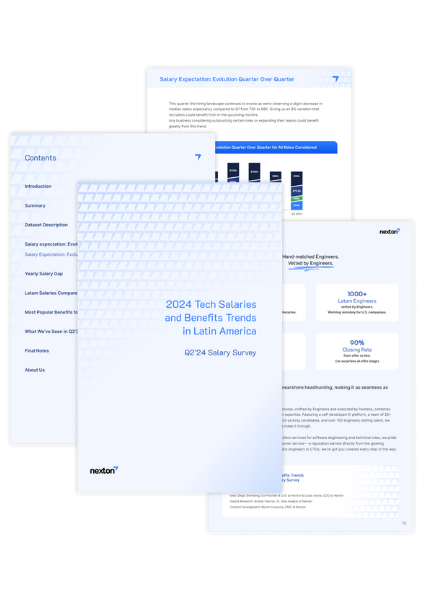As the tech industry continues to evolve, more and more companies are looking for remote hires to meet their demand for tailored software solutions. As a senior developer looking to take advantage of these remote opportunities, knowing how to clearly set salary expectations with a potential employer is crucial.
“What are your salary expectations?” is one of the most common interview questions you’ll face as a senior developer looking for remote work. Whether it’s over an initial phone screening or in a second or third-round interview, setting clear salary expectations is key to landing a developer position that’s fulfilling and satisfying.
Unfortunately, we often see even senior developers struggle to comfortably negotiate their salaries. In this article, we’ll share our top tips to help you clearly set the right salary expectations at your upcoming interview and land the engineering job and salary you deserve.

5 tips to comfortably negotiate salary expectations
- Know what you’re worth
Knowing the going rate for a senior software developer’s salary is key when setting salary expectations with a potential employer. As a senior developer looking to work remotely with companies in the US, it’s crucial you know the expected salary range for someone of your caliber across the country. Glassdoor, Payscale, and Paylab are all reliable sources of information about the average salary for engineers across the US and the world. In addition, you can check out our latest Tech Salaries & Benefits Trends Report to find up-to-date salary info for your ideal remote role.
Keep in mind that the salary expectations you negotiate with an employer may vary depending on the size of the company, as well as the benefits and unique pay package it offers (see tip #3).
- Set a floor
Once you’ve got a solid understanding of the current engineer salary at the type of companies you’re interested in, it’s a good idea to set yourself a floor (or minimum salary) you’d feel comfortable accepting. Obviously, you’ll want to negotiate salary expectations that exceed this number, but having a floor in place can be a good personal exercise to ensure the opportunities you’re interviewing for fit your needs
Note that there’s no need to share your salary floor with a recruiter or hiring manager. Use it as a personal guide and budget to help set clear salary expectations the next time you interview for an opportunity.
- Weigh up company benefits and culture
When discussing salary expectations with a staffing agency or employer, make sure to read beyond the numbers. A company’s work culture and benefits plan should be a relevant part of your considerations when thinking about accepting an offer based on the number on your final paycheck.
At Nexton, we always ask our candidates about their salary expectations from the start to ensure we pair them with the right opportunities. When hashing out your salary requirements with one of our recruiters, make sure to also set clear expectations about the benefits and company culture you’re interested in.

- Choose when to divulge your salary history
Some companies or recruiting agencies may ask you about your salary history. At Nexton, for example, we ask our candidates about their current salary to help better place them in roles that promote their growth. How you choose to answer this question, however, is completely up to you.
If you’re comfortable revealing your salary history, remember that sharing this information can help our recruiters place you in the right position.
- Be prepared to negotiate your salary expectations
According to a 2019 survey by Robert Half, 70% of hiring managers said they expect candidates to negotiate their salary expectations. The same survey, however, found that only 55% of workers actually negotiated their salary the last time they got a job offer. Those that didn’t negotiate their salary expectations clearly left money on the table.
Not only does negotiating your salary expectations demonstrate a solid understanding of your value as a developer but, as the survey mentioned above shows, it’s also expected by the majority of hiring managers in the US.
For tips on how to negotiate your salary expectations the next time you get an offer, read our article on salary negotiations here.
Answering salary expectations questions
There are many ways to answer a recruiter when they ask about your salary expectations. Use your floor and know-how of average developer salaries to give them a clear salary range that works for you. Also, remember to bring up company benefits and culture to help guide a recruiter in matching you with the opportunities that best fit you.
Settling on the right salary when interviewing for a remote development role can seem daunting, but it doesn’t need to be. Check out our Tech Salaries & Benefits Trends Report and join Nexton to find the perfect remote engineering jobs across the US.



